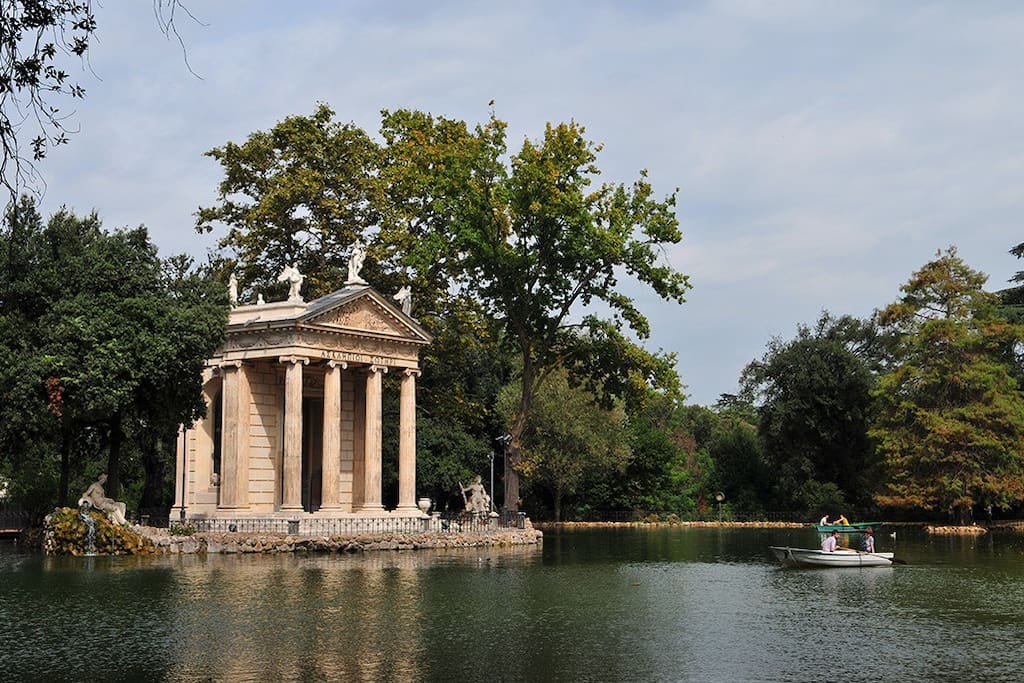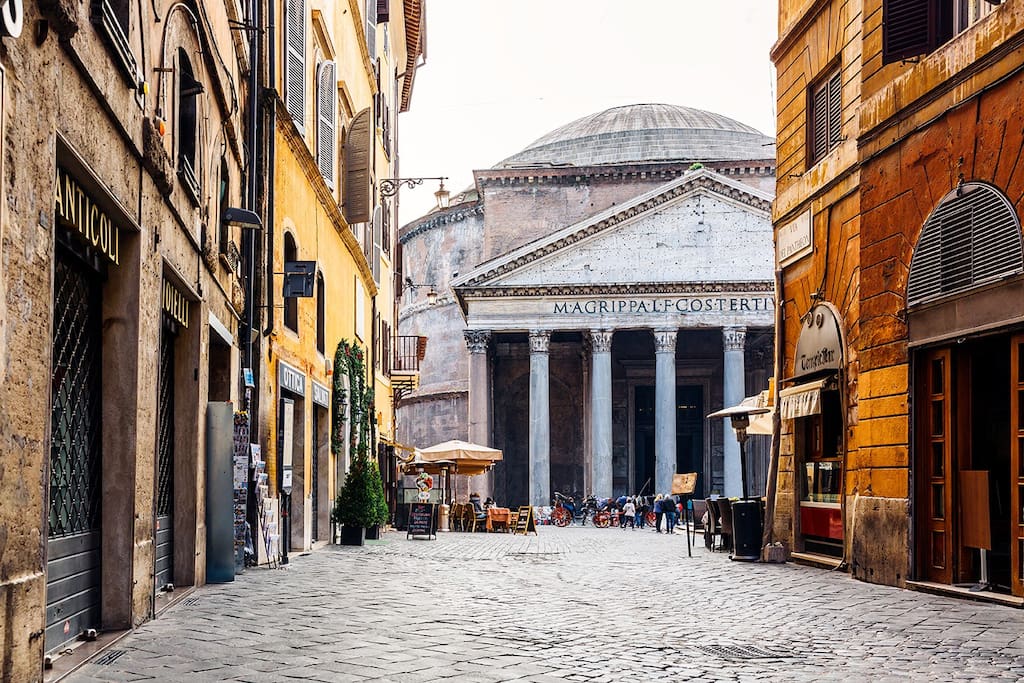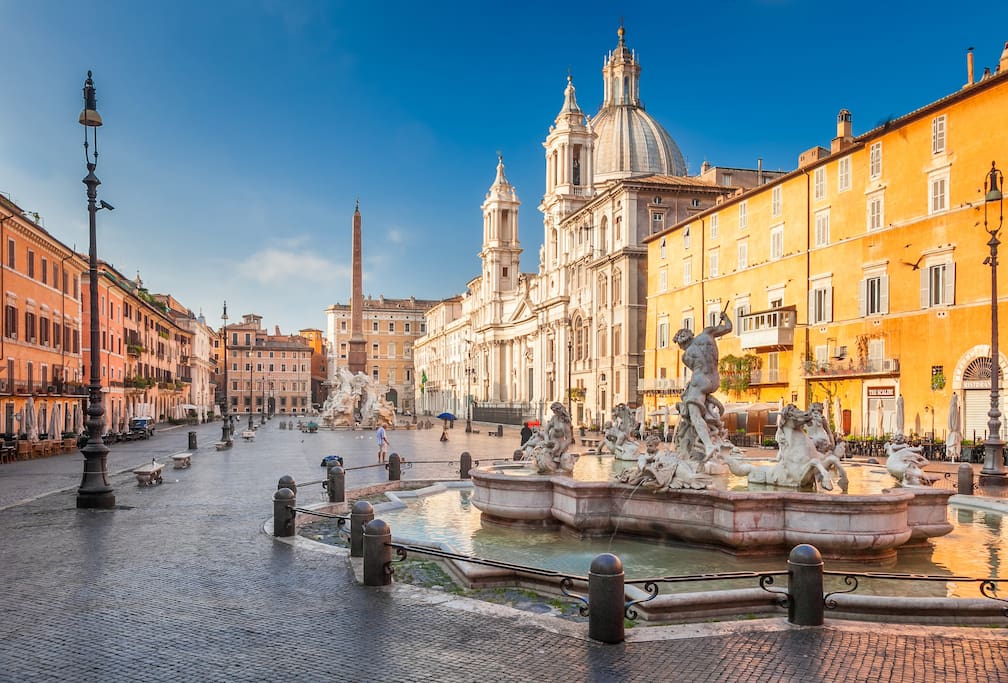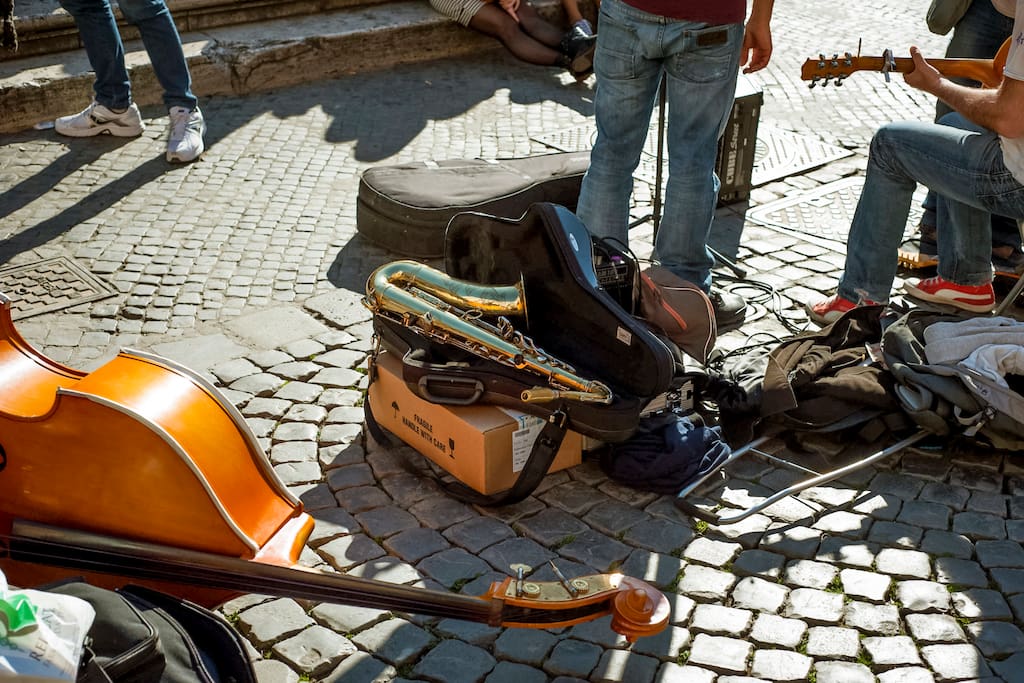Parks & Nature
Villa Borghese is a landscape garden in the naturalistic English manner in Rome, containing a number of buildings, museums (see Galleria Borghese) and attractions. It is the third largest public park in Rome (80 hectares or 197.7 acres) after the ones of the Villa Doria Pamphili and Villa Ada. The gardens were developed for the Villa Borghese Pinciana ("Borghese villa on the Pincian Hill"), built by the architect Flaminio Ponzio, developing sketches by Scipione Borghese, who used it as a villa suburbana, a party villa, at the edge of Rome, and to house his art collection. The gardens as they are now were remade in the early nineteenth century.
2099 habitants recommandent
Villa Borghese
Piazzale Napoleone I Villa Borghese is a landscape garden in the naturalistic English manner in Rome, containing a number of buildings, museums (see Galleria Borghese) and attractions. It is the third largest public park in Rome (80 hectares or 197.7 acres) after the ones of the Villa Doria Pamphili and Villa Ada. The gardens were developed for the Villa Borghese Pinciana ("Borghese villa on the Pincian Hill"), built by the architect Flaminio Ponzio, developing sketches by Scipione Borghese, who used it as a villa suburbana, a party villa, at the edge of Rome, and to house his art collection. The gardens as they are now were remade in the early nineteenth century.
Food Scene
A very nice location and a very local and good restaurant!
Special for dinner time
17 habitants recommandent
Osteria del Sostegno
5 Via delle ColonnelleA very nice location and a very local and good restaurant!
Special for dinner time
Very convenient for lunch time and it's very nice to go there in a sunny day!
9 habitants recommandent
La Tavernetta 48
48 Via degli SpagnoliVery convenient for lunch time and it's very nice to go there in a sunny day!
La Fraschetta
134 Via di S. Francesco a RipaCasual, good and local place! Great wine and great meat!
Gran Caffè La Caffettiera
65 P.za di PietraA beautiful bar in a wonderful place!
Sightseeing
Fontaine de Trevi
Piazza di TreviA famous and beautiful fountain in the heart of Rome!
The Pantheon is the best preserved building from ancient Rome and was completed in c. 125 CE in the reign of Hadrian. Its magnificent dome is a lasting testimony to the genius of Roman architects and as the building stands virtually intact it offers a unique opportunity for the modern visitor to step back 2,000 years and experience the glory that was Rome.
1342 habitants recommandent
Panthéon
Piazza della Rotonda The Pantheon is the best preserved building from ancient Rome and was completed in c. 125 CE in the reign of Hadrian. Its magnificent dome is a lasting testimony to the genius of Roman architects and as the building stands virtually intact it offers a unique opportunity for the modern visitor to step back 2,000 years and experience the glory that was Rome.
Piazza Navona is one of the most famous and arguably the most beautiful of Rome's many squares. The large and lively square features no less than three magnificent fountains. Another eyecatcher is the Baroque church of Sant'Agnese in Agone.
1722 habitants recommandent
Place Navone
Piazza NavonaPiazza Navona is one of the most famous and arguably the most beautiful of Rome's many squares. The large and lively square features no less than three magnificent fountains. Another eyecatcher is the Baroque church of Sant'Agnese in Agone.
Located almost in the 'geometric centre' of Rome (after a complex series of reconstructions),
Piazza Venezia was named after the Cardinal Venezia who, in 1455, ordered the construction of his own Palace (Palazzo Venezia) that later became the seat of 'Serenissima' (Republic of Venice).
576 habitants recommandent
Piazza Venezia
Located almost in the 'geometric centre' of Rome (after a complex series of reconstructions),
Piazza Venezia was named after the Cardinal Venezia who, in 1455, ordered the construction of his own Palace (Palazzo Venezia) that later became the seat of 'Serenissima' (Republic of Venice).
It is a road in the centre of the city of Rome, Italy, that runs in a straight line from the Piazza Venezia to the Colosseum. Its course takes it over parts of the Forum of Trajan, Forum of Augustus and Forum of Nerva, parts of which can be seen on both sides of the road. Since the 1990s, there has been a great deal of archeological excavation on both sides of the road, as significant Imperial Roman relics remain to be found underneath it.
147 habitants recommandent
Via dei Fori Imperiali
Via dei Fori ImperialiIt is a road in the centre of the city of Rome, Italy, that runs in a straight line from the Piazza Venezia to the Colosseum. Its course takes it over parts of the Forum of Trajan, Forum of Augustus and Forum of Nerva, parts of which can be seen on both sides of the road. Since the 1990s, there has been a great deal of archeological excavation on both sides of the road, as significant Imperial Roman relics remain to be found underneath it.
Located just east of the Roman Forum, the massive stone amphitheater known as the Colosseum was commissioned around A.D. 70-72 by Emperor Vespasian of the Flavian dynasty as a gift to the Roman people.
362 habitants recommandent
Piazza Del Colosseo station
Located just east of the Roman Forum, the massive stone amphitheater known as the Colosseum was commissioned around A.D. 70-72 by Emperor Vespasian of the Flavian dynasty as a gift to the Roman people.
Piazza di Spagna, at the bottom of the Spanish Steps, is one of the most famous squares in Rome. It owes its name to the Palazzo di Spagna, seat of the Embassy of Spain among the Holy See. Nearby is the famed Column of the Immaculate Conception of the Blessed Virgin Mary.
1307 habitants recommandent
Piazza di Spagna
Piazza di SpagnaPiazza di Spagna, at the bottom of the Spanish Steps, is one of the most famous squares in Rome. It owes its name to the Palazzo di Spagna, seat of the Embassy of Spain among the Holy See. Nearby is the famed Column of the Immaculate Conception of the Blessed Virgin Mary.
Piazza del Popolo is a large urban square in Rome. The name in modern Italian literally means "People's Square", but historically it derives from the poplars (populus in Latin, pioppo in Italian) after which the church of Santa Maria del Popolo, in the northeast corner of the piazza, takes its name.
797 habitants recommandent
Place du Peuple
Piazza del PopoloPiazza del Popolo is a large urban square in Rome. The name in modern Italian literally means "People's Square", but historically it derives from the poplars (populus in Latin, pioppo in Italian) after which the church of Santa Maria del Popolo, in the northeast corner of the piazza, takes its name.
The Via del Corso (ancient Via Lata, the urban stretch of Via Flaminia), is a main street in the historical centre of Rome. It is remarkable for being absolutely straight in an area characterized by narrow meandering alleys and small piazzas. Considered a wide street in ancient times, today the Corso is approximately 10 metres wide, and it only has room for two lanes of traffic and two narrow sidewalks. The northern portion of the street is a pedestrian area. The length of the street is roughly 1.5 kilometres.
657 habitants recommandent
Via del Corso
Via del CorsoThe Via del Corso (ancient Via Lata, the urban stretch of Via Flaminia), is a main street in the historical centre of Rome. It is remarkable for being absolutely straight in an area characterized by narrow meandering alleys and small piazzas. Considered a wide street in ancient times, today the Corso is approximately 10 metres wide, and it only has room for two lanes of traffic and two narrow sidewalks. The northern portion of the street is a pedestrian area. The length of the street is roughly 1.5 kilometres.
Piazza d'Aracoeli is a square of Rome, placed at the base of the Capitoline Hill, in the Rione X Campitelli.
Piazza d'Aracoeli
Piazza d'AracoeliPiazza d'Aracoeli is a square of Rome, placed at the base of the Capitoline Hill, in the Rione X Campitelli.
Campo de' Fiori is a rectangular square south of Piazza Navona in Rome, at the border between rione Parione and rione Regola. It is diagonally southeast of the Palazzo della Cancelleria and one block northeast of the Palazzo Farnese. Campo de' Fiori, translated literally from Italian, means "field of flowers". The name dates to the Middle Ages when the area was a meadow.
787 habitants recommandent
Campo de' Fiori
Campo de' FioriCampo de' Fiori is a rectangular square south of Piazza Navona in Rome, at the border between rione Parione and rione Regola. It is diagonally southeast of the Palazzo della Cancelleria and one block northeast of the Palazzo Farnese. Campo de' Fiori, translated literally from Italian, means "field of flowers". The name dates to the Middle Ages when the area was a meadow.
The entire zone revolve around the little piazza Madonna dei Monti, with its characteristic Catecumeni Fountain, designed by Giacomo della Porta.
In this charming rione, locals mill down the streets and up the sidewalks; they flood into the piazzas, the gourmet food shops and slow food restaurants that line the same roads. At night, excellent wine bars (with fair price tags) accommodate clients in their cozy and welcoming atmospheres.
399 habitants recommandent
Rione Monti
The entire zone revolve around the little piazza Madonna dei Monti, with its characteristic Catecumeni Fountain, designed by Giacomo della Porta.
In this charming rione, locals mill down the streets and up the sidewalks; they flood into the piazzas, the gourmet food shops and slow food restaurants that line the same roads. At night, excellent wine bars (with fair price tags) accommodate clients in their cozy and welcoming atmospheres.
Trastevere is the 13th rione of Rome, on the west bank of the Tiber, south of Vatican City, and within Municipio I. Its name comes from the Latin trans Tiberim, meaning literally "beyond the Tiber". Its logo is a golden head of a lion on a red background, the meaning of which is uncertain. To the north, Trastevere borders the XIV rione, Borgo.
1330 habitants recommandent
Trastevere
Trastevere is the 13th rione of Rome, on the west bank of the Tiber, south of Vatican City, and within Municipio I. Its name comes from the Latin trans Tiberim, meaning literally "beyond the Tiber". Its logo is a golden head of a lion on a red background, the meaning of which is uncertain. To the north, Trastevere borders the XIV rione, Borgo.
The Papal Basilica of St. Peter in the Vatican or simply St. Peter's Basilica ,, is an Italian Renaissance church in Vatican City, the papal enclave within the city of Rome.
850 habitants recommandent
St. Peter's Basilica
Piazza San PietroThe Papal Basilica of St. Peter in the Vatican or simply St. Peter's Basilica ,, is an Italian Renaissance church in Vatican City, the papal enclave within the city of Rome.
Arts & Culture
Musées du Vatican
Louve du Capitole
1 Piazza del CampidoglioGalerie Borghèse et Musée
5 Piazzale Scipione BorgheseEntertainment & Activities
Teatro dell'Opera di Roma
Piazza Beniamino GigliEssentials
Coop
7 Via GiustinianiCarrefour Express
10 Via di Porta CastelloGetting Around
Largo di Torre Argentina
Largo di Torre ArgentinaBus stop





